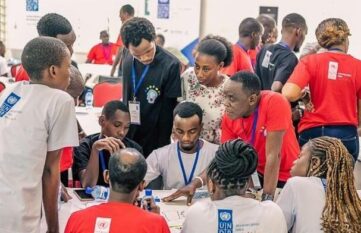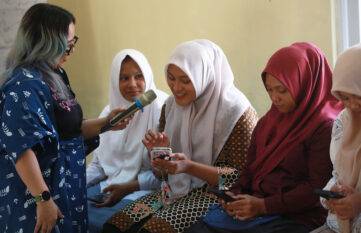5 Questions for… Dr. Bärbel Kofler
International Women’s Day is celebrated worldwide on 8 March. This year, UN Women has chosen digitalisation as its theme: DigitALL: Innovation and Technology for Equality. How can digital technologies contribute to equality?
The first thing is to break down barriers. Women make up half of the world’s population. But men still outnumber women in the digital world – especially in the partner countries of German development cooperation. In the poorest countries worldwide, just one in five women has access to the internet – among men it is at least one in three. This gap also affects other areas: More than 90 per cent of the world’s jobs now have a digital component. Without digital skills, it is difficult to find a good job and escape poverty. Women are particularly affected here. The goal must be to create framework conditions to close this gender gap.
How is the BMZ advancing the implementation of gender-equitable frameworks?
The disadvantages that women and girls face in other areas are also reflected in their digital access. It starts with traditional gender roles and continues in education – if girls go to school less often and for shorter periods of time, they lack basic skills in dealing with digital technologies . That’s why we specifically strengthen women and girls with courses and offers for digital skills. As banal as it may sound, the fact that so many women continue to be “offline” also has something to do with the high costs. Women often hold back the money for the basic existential needs in the first place. In many partner countries, especially in Africa, the internet is simply prohibitively expensive. So even in countries where the internet use would technically not be a problem, the actual use remains far behind its possibilities. That’s where we come in and support countries, for example, in regulating their markets to make internet tariffs affordable for the general population. In addition, I am convinced that we need role models – and a female perspective on the topic of digitisation: Therefore, Minister Schulze, together with the International Telecommunication Union (ITU), is supporting a network of female digital ministers. By the way, for the first time in history, the ITU has a woman at its top. That’s a great opportunity!
The BMZ alone can certainly not meet this challenge – closing the digital gender divide – which partners are you relying on?
Indeed, it cannot be done alone. It needs a joint effort! As a ministry, we count on the cooperation with our partners from politics, the private sector, academia and civil society. An important step for effective cooperation was the launch of the development policy [digital.global] network in December 2022. It brings together actors from the private sector, science and society for the goals of digital development cooperation to jointly support a digital transformation in partner countries that is fair, feminist and sustainable.
That sounds promising. What concrete projects have already been developed in cooperation with partners?
One important project is the digital learning platform atingi. It promotes digital skills by providing high-quality learning content and targeting it at women and girls – for example, with courses that raise awareness and empower women and girls to protect themselves from online gender-based violence. In collaboration with the ITU, GSMA, Ernst & Young and W4, atingi will be involved in the Her Digital Skills initiative this year, to ensure that one million women and girls can take part in free digital skills training by 2026. Through this, we aim to expand the talent pipeline of girls and young women in STEM fields and improve their employment opportunities in the sector.
What do you wish women and girls in 2023?
More female role models in STEM professions: Because role models from one’s own environment have a great influence on the later choice of study or career. Even though the digital divide remains a major challenge, there are also positive signs: In Turkey, for example, women now account for one third of computer science degrees. In Oman and Malaysia, about half of all engineers are women. It is the task of politics to create structures that enable equal participation of all people in politics, the economy and society. And it is up to each and every individual to use the opportunities that arise from this and perhaps become a role model themselves. By the way, this also applies to us in Germany!



